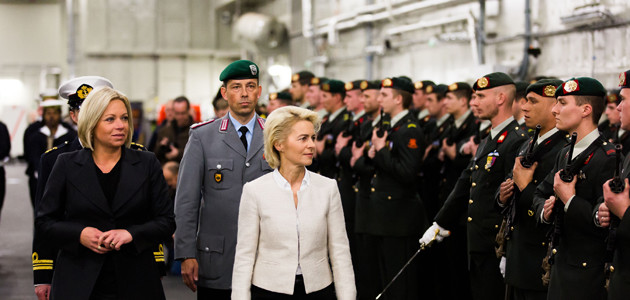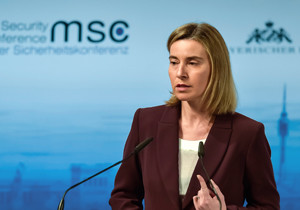Does closer cooperation between the Bundeswehr and the Dutch military represent a model for a European Defence Union? An overview of the debate at the Colloquium

Closer cooperation: Ursula von der Leyen, German Minister of Defence, with her Dutch counterpart Jeanine Hennis-Plasschaert, on the multi-purpose support ship “Karel Doorman” on 4 February 2016. picture: Ministerie van Defensie
“This is a model for the creation of a European Defence Union” is how, in early February this year, Ursula von der Leyen, German Minister of Defence, described the agreement between the Bundeswehr and the Armed Forces of the Netherlands to mutually place troops and materiel under each other's command (report by the Federal Ministry of Defence). Greater cooperation among national armed forces was one of the main topics of the 2016 Berlin Colloquium “The EU as a Foreign and Security Policy Player – Reality or Vision? What are the Consequences for Germany and the Bundeswehr?”. The conference was organised jointly by the Clausewitz Society and the Federal Academy for Security Policy in mid-March.
Jari Vilén, EU ambassador to the Council of Europe, gave an overview of the security situation in Europe. In view of the resurgence of national interests that were threatening Europe's values, and the upcoming referendum on whether Great Britain should remain in the EU, Europe had to try, he said, to define shared interests and values in order to find pan-European solutions. These solutions would then be implemented by the member states, in accordance with usual EU practice. He claimed that member states rarely tapped into the potential harboured by the EU Treaties to find solutions of this kind. He thus considered it a positive development that France became the first member state to make use of this opportunity by invoking the EU's mutual defence clause after the Paris attacks of last autumn.
In favour of a clear separation of tasks between NATO and the EU
Karl-Heinz Kamp, President of the Federal Academy for Security Policy, warned against exaggerated expectations regarding the military component of the Common Foreign and Security Policy. Instead, the EU and NATO should divide tasks between them, as they did during the Russia-Ukraine crisis. “NATO ensures military deterrence and defence, the EU focuses on political crisis management.” While military cooperation had grown in Europe – not least owing to a more efficient use of financial resources –, it was mostly between individual member states. Europe's military capabilities should be pooled under the umbrella of NATO and not at a European level, Kamp said.
Johannes Varwick, Professor for International Relations and European Policy in Halle, outlined cooperation opportunities in international relations: in a period of stagnating institutionalised cooperation combined with an increasing pressure to address problems, institutions such as the United Nations were faced with new challenges. Problem-oriented ad-hoc formats and “coalitions of the willing” were the instruments of the future. Against this backdrop, NATO's significance would increase, according to Varwick, whereas the EU would experience growing pressure.
In the first panel of the Colloquium, Jana Puglierin stated that, given the scarcity of military resources, the enabling and empowering of local forces was an effective crisis management tool. The EU should urgently include this tool in its foreign and security policy options. But the programme manager of the Alfred von Oppenheim Centre for European Policy Studies also agreed with Varwick, referring to groups of “EU 1,2,3 plus X” from the ranks of EU member states, which would form new, ad-hoc multilateral entities to tackle challenges of foreign and security policy.
“Ambitious pragmatism”

A leading advocate of an EU policy that gains global credibility by focusing on its neighbours: Federica Mogherini, High Representative of the European Union for Foreign Affairs and Security Policy, here at the 2016 Munich Security Conference. picture: EU/Günter Schiffmann
Colonel Helmut Frietzsche, Chief of the “EU Common Security and Defence Policy” Branch at the Federal Ministry of Defence, mentioned current German-Dutch initiatives and explained that the long-term objective was a “European Defence Union”, which in turn could be the first step towards common EU armed forces. This project could, for example, build on the European Air Transport Command in Eindhoven, which he considered a good example of pooling and sharing.
Lieutenant General Hans-Werner Wiermann, German Military Representative to the NATO and EU Military Committee, and Jörg Bentmann, Director-General responsible for “EU and International Affairs” at the Federal Ministry of the Interior, made it clear that the EU should focus more on the civilian elements of foreign and security policy. Nicolai von Ondarza, Deputy Head of the EU/Europe Research Division at the German Institute for International and Security Affairs, went even further: the EU should, for now, put the idea of a Common Security and Defence Policy on hold and, instead, tackle the underlying structural problems that were not rooted in foreign and security policy. Nevertheless, he added, the EU should strive to become an effective regional player. He referred to the Common Security and Defence Policy as “ambitious pragmatism”: even though it was stagnating at the political level of the EU-28, it was working quite well in practice – in missions of member states. The debate led to the conclusion that the EU was currently not living up to its own aspirations of being a major player in security policy, while at the same time the current crises were exerting considerable pressure on policymakers to take action.
Are the positive examples sufficient, given the current level of ambition?
On the second day of the Colloquium, Andreas Nick, Member of the German Bundestag (CDU) and member of the Foreign Affairs Committee, also highlighted the close military cooperation between Germany and the Netherlands. According to Professor Michael Staack of the Bundeswehr University in Hamburg, cooperation with France was equally successful on an operational level. On a strategic level, however, Paris could be more cooperative than at the moment. The German-French engine alone was not sufficient for leading Europe any longer, he felt, since regarding the future of European Foreign and Security policy, the EU did not engage in common situation analysis and was not able to define a true common interest. The European position should not consist of a mere transfer of national interests to an EU level. All panellists agreed that the Union was not in a sound condition at the moment.
Representing Chief of Defence Volker Wieker, Lieutenant General Dieter Warnecke, Director-General for Strategy and Operations at the German Ministry of Defence, analysed the consequences of operational reality on the Bundeswehr – against the backdrop of European cooperation efforts so far. He praised German-Dutch cooperation as an excellent example of military integration. Because of the heavy workload and the high level of ambition, troops needed sufficient well-trained personnel and operational materiel, he said. Additionally, the Bundeswehr was going to have to rebuild capabilities that had fallen victim to budget cuts in recent years. For this reason, he concluded, 1,500 procurement projects totalling 130 billion euros were planned for the next fifteen years.
Author: Johannes Wiggen
